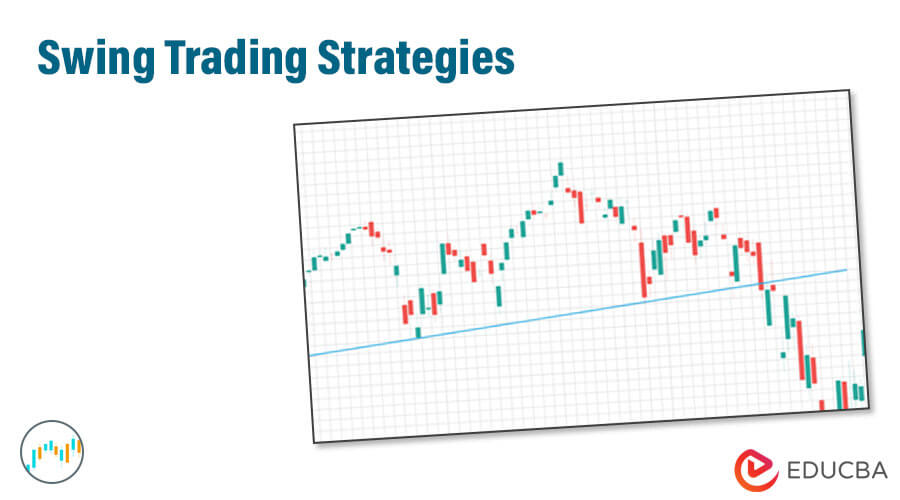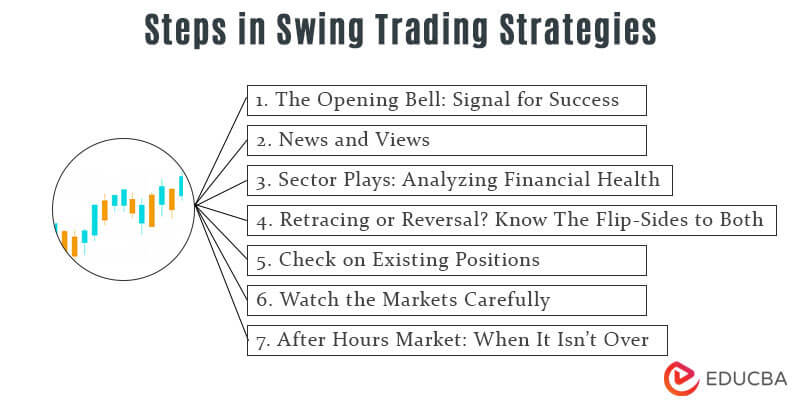Updated October 30, 2023
Introduction to Swing Trading Strategies
If you are not trading pro, there’s hope yet. Swing trading for beginners has many distinct advantages, so if you are a fledgling in the stock markets, you can still watch your trading profits using this interesting technique for trading. There are many obvious and hidden advantages of swing trading strategies. Let’s oscillate from one to the other to unearth why swing trading for beginners has the right balance in the stock market.
A Boon for Beginners
1. Swing Trading Strategies Can Be Part-Time Too
Swing trading for beginners does not have to be a full-time job, as anyone with enough know-how and capital can swing it in the markets. Due to the longer time frame for swing trading for beginners, trades can be carried out without constant monitoring and regulation. Even if you are not a full-time trader but a novice, this has many advantages for those who cannot spare time to go head-on in the markets.
2. Swing Trading Strategies Yields Golden Profits
If there is a silver lining in the cloud for swing trading for beginners, it is a golden opportunity for profits. Trade remains open for days or weeks, meaning traders can cash in on higher profits and multiply the same security daily.
3. Regular Monitoring Not Required All The Time
Swing trading strategies score high on other criteria, such as setting stop losses. Day trading means you have to be watching trading positions all the time. With swing trading for beginners, the only risk is a stop being executed at the wrong price.
4. Swing Trading Strategies = Less Stress
Swing trading strategies is not a full-time occupation. You can make profits without spending a lot of time in the markets. This means burnout and stress will be less if you are a swing trader. You can even have a regular job or different sources of income to undo the impact of trading losses in what can be described as a win-win scenario.
5. Swing Trading Strategies Are Simple, Day Trading is Complex
Swing trading for beginners can be carried out with traditional trading tools and a single computer. This does not require expensive technology or heavy-duty equipment, unlike day trading.
6. Swing Trading Strategies is Popular
This is one of the most common styles used by traders. Many swing traders even close out positions after taking advantage of marketplace momentum. This means that holding on to a position until it pays to let go is the primary basis of swing trading for beginners…something that risk-averse traders will prize. While the marketplace can be rewarding, it is also the most significant risk for traders. Reading trends incorrectly can lead to disastrous ends to your epic trading sessions. So, swing trading strategies have the advantage of being easy to monitor and profitable for those who are seeking to capitalize on the markets. Chasing the markets will not get you anywhere, but assessing trends correctly will be perfect for those who want to always be on the mark.
7. There’s a Strategy to Swing Trading For Beginners
While traders have to win and lose trades, what is always more important is that gains should outdo losses, and traders should not lose more than they can afford to. Comfort with the trading style makes it easier to secure profits. Advanced traders can use both types in their range of trading styles. However, beginners would do well to master swing trading first because of the clear-cut strategy it involves.
8. Natural Flow Of Trading Followed
Swing trading strategies allow beginners in the market to make profits on the natural movement of the markets. It is important to remember that markets cannot move in one direction forever. There has to be some momentum and moments of calm in the markets. One can increase returns when the market rises and stand back when it pulls backward. This is why swing trading for beginners offers sustained advantages even if you are not an ace in the markets.
9. Market means Opportunity for Swing Traders
More opportunities can be identified in and out of the markets than remaining at one point and looking out. It is also easier to chart changes in the long term and catch the trend in this way. Closing the first position means money will not have to be deposited to cover the second. Stop losses allows you to take the risk without losing the reward.
10. Clear Boundaries Make Swing Trading Strategies Easy
Crystal-clear boundaries ensure you can shatter stock market records for swing trading. If you feel that a trade does not work in your favor, damage control is possible. Long-term trading means giving a wider berth to the markets, while swing trading for beginners offers the undeniable advantage of a stop loss.
11. Fundamental or Technical Analysis?
Swing trading strategies blend technical and fundamental analysis to catch market momentum and provide options when there is a lull. There is an efficient use of capital and higher returns, and drawbacks involve higher commissions and greater volatility. Average retail traders would not have the advantage in swing trading for beginners. Though they have greater experience, more leverage, fewer commissions, and detailed information, there are limitations in their trading instruments.
Steps in Swing Trading Strategies
For novice traders, swing trading strategies are an essential skill to acquire. Here are the steps you need to follow to get the profits you want.
1. The Opening Bell: Signal for Success
Retail swing traders begin their day much before the opening bell. The time right before opening is critical for getting an overall feel for the market, creating trades, and checking up on current positions.
2. News and Views
Another task of the day is to catch up with the latest news and information in the markets. Market developments have to be monitored continuously for more significant gains. You need to watch out for market and sector sentiments and present holdings. Some aspects that need to be monitored include bullish and bearish trends, key economic reports, inflation, currency, international trading sessions, and more. News, financial reports, and earnings are hot topics for the day. Using sites such as stock market filings for information will also help traders turn on the heat in the markets.
3. Sector Plays: Analyzing Financial Health
Analyzing the news associated with well-known financial information sites can create an understanding of which sectors are performing well. For example, the energy sector is budding, and the higher the risk, the more the return. Riding trends to the finishing post can be the secret of success in the race for market profits.
4. Retracing or Reversal? Know The Flip-Sides to Both
Chart breaks offer a massive chance to make profits for swing traders. Traders heavily trade these swing trading stocks near a point of support or resistance. There are many ways to predict how to make or break the markets from Wolfe Waves to Fibonacci levels. A watch list of the swing trading stocks can also be created daily. Swing trading stocks that look hot should make it to the list of associated opportunities, entry, target prices, and stop-loss prices.
5. Check on Existing Positions
To know where to head in the markets, you must be clear about where you have been. A thorough understanding of existing positions is a must. Stock symbols can be checked into a news service to see if filings have been made and how this can affect trading plans and opportunities.
6. Watch the Markets Carefully
Markets are open at certain hours. This is the time to be on the watch, especially if you are swing trading. Head fake bids and asks placed to confuse retail trading can be a real problem. Check the market maker while making the trade. If your moves are not in tandem with what is happening in the markets, don’t expect to make money. Once traders have made some gains, they look for the exit point. This can only be done through technical analysis. Adjustments also need to be carried out based on future trading. Entering and exiting trades also requires a considerable understanding of how the markets move.
7. After Hours Market: When It Isn’t Over
After-hours trading is used for placing trades where the spread is too much to justify. After-hours trading is all about performance evaluation. Record trades for tax and performance assessment. Performance evaluation is an important part of trading. During the after-hours, markets are still on, though not technically. Paying attention to after-hour earnings can impact the level of profits you make.
Follow These Commandments of Swing Trading Strategies
If you want to make money in the markets, and this is your initial time trading, swing trading strategies can make all the difference between profits and losses. These golden trading rules will guide you on how to achieve that quickly.
1. Align Your Trade with Overall Market Direction
The overall direction of the market needs to be measured by S&P. When discussing trades and trends, make sure to handle primary and intermediate trades. The context in which you make the decision is also important. If the focus is only on trade in the short term, you may be missing out on the bigger picture. One must identify longer-term trends to flow with the flow and not oppose it, as the profit potential is also limited. Everything from news announcements to analyst upgrades and downgrades, as well as earning hits or misses, should always be guided by the more significant trend. Long-term trends tend to influence the market’s direction.
2. Analyze the markets
Once you know the overall trend, do not fight against the markets. Work with them. Go short rather than going on and incorporate price relative to the index within the chart analysis. When it’s bearish, look for swing trading stocks going downwards and vice versa.
3. Trade-in Harmony with the Trend
Ensuring that trading is not compromised in quality involves keeping a close watch on the trends. The trend may be your friend, but are you going the same way? Use moving averages if you want to stay in touch with trends. This does not mean you blindly follow primary trends, as even within the bear market, periods are when the intermediate trend is positive, and swing trading stocks rise. Short-term traders should also have an idea of the bigger picture. Understand if the swing trading stocks tell a story and provide reliable signals regarding future movements. Once the trend has begun, trading becomes more profitable, and risk lowers.
4. Try to enter towards the start of the trade, not when it ends
The quicker you realize a trend has formed, the higher you can climb the profits ladder. The earlier you catch the change in trends, the more effective you will be. Paying attention to the overall market average is important because that which comes up must also go down eventually. There are many ways to assess if the market is prone to reversal, such as the Arms Index and the Put/Call Ratio. Candlesticks, as well as momentum indicators like stochastics, can serve as alarm bells.
5. Many indicators are better than only one
Trading should not be in technical tools or concepts in isolation. From candlesticks to volume and moving averages, the same message reverberates regarding the rise or the fall of swing trading stocks. Use one indicator to confirm the trend of another.
The Bottomline
In conclusion, clarity is an essential ingredient of a practical trading plan. It is tough to consolidate profits in the market without a clear-cut understanding of trends and points of support and resistance.
Recommended Articles
This has been guiding to Swing trading strategies for beginners has many distinct advantages, so if you are a fledgling in the stock markets, you can still watch your trading profits. These are the following external links related to Swing trading.





